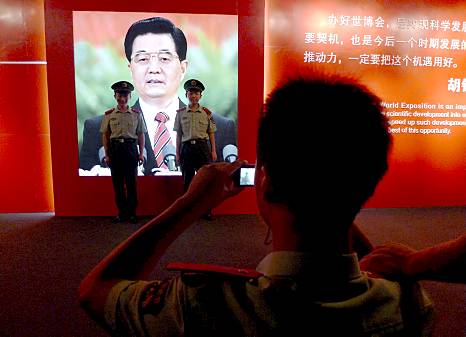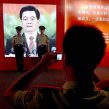
Hu’s Anti-Graft Drives Lack Institutional Checks and Reforms
Publication: China Brief Volume: 9 Issue: 17

While an anti-corruption campaign has been launched almost annually since the start of the reform era in 1978, there are reasons to believe the Chinese Communist Party (CCP) is committing more resources to tackling graft this year. Clean governance and the allied goal of “party construction” are key themes of the upcoming Fourth Plenary Session of the 17th CCP Central Committee set for late September. Moreover, General Secretary and President Hu Jintao is expected to announce achievements on the anti-graft front at events celebrating the PRC’s 60th birthday on October 1 (AFP, August 6; China News Service, June 23). Yet doubts remain as to whether the Hu administration will go one step further and introduce institutional checks and balances, as well as allow scrutiny from the media and independent anti-graft agencies, in order to better eradicate the scourge of graft and related malfeasances.
According to the resolution of the latest Politburo meeting, the main agenda of the Fourth Plenum will be “to study the issue of strengthening and improving party construction under new circumstances.” Apart from raising the level of the party’s “leadership and governance capability,” the priority of the Hu leadership is “to elevate [cadres’] ability to resist corruption, prevent [unwholesome] changes and tackle and counter risks” (Xinhua News Agency, July 23). According to Outlook Weekly, party authorities are “clearly aware” that corruption among cadres “has seriously affected the party’s image … and it is the phenomenon with which the masses are most dissatisfied with.” The theoretical journal disclosed that the Central Committee conclave would recommend “institutional arrangements to meet public expectations” such as stringent measures on the disclosure of the assets of party and government officials (Outlook Weekly [Beijing], July 25; Hong Kong Economic Journal, August 14).
While the world eagerly awaits the outcome of the plenum, it is noteworthy that every month for the past year, at least one cadre at the level of assistant minister or above has been nabbed for “economic crimes” and allied felonies. Foremost among them are the Assistant Minister of Public Security Zheng Xiaodong; head of the multi-billion dollar Binhai Development Zone in Tianjin, Pi Qiansheng; Mayor of Shenzhen Xu Zongheng; and the Vice-President of the Supreme People’s Court (SPC) Huang Songyou (Xinhua News Agency, August 11; China Daily, June 18). One notable feature of the ongoing anti-graft campaign is that apart from senior party and government officials, so-called “big tigers” among the miscreants have included the bosses of state-held conglomerates as well as globally known private firms.
The latest CEO to have fallen prey to the dragnet is Kang Rixin, the Communist Party boss and General Manager of China National Nuclear Corporation (CNNC), which is in charge of China’s nuclear energy program. As a member of the CCP Central Committee, Kang is one of 204 most powerful cadres in the country. The official Xinhua News Agency said earlier this month that Kang had received ill-gotten gains of 1.8 billion yuan ($260 million). At about the same time, two ministerial-ranked chiefs of state-owned conglomerates, Li Peiying and Chen Tonghai, were respectively executed and given a suspended death sentence (Wall Street Journal, August 6; Dazhong Daily [Shandong], July 7). Li was the chairman of Capital Airports Holding Company, while Chen was the chief executive of Sinopec, the giant oil monopoly. Police chief Zheng, together with several high-profile cadres including the former chairman of the Guangdong Province People’s Political Consultative Conference Chen Shaoji, was incarcerated earlier this year for having provided advantages to the disgraced Chairman of GOME Appliances, Huang Guangyu. Huang, 39, who has yet to be formally charged by police, was until recently considered one of China’s richest men (Financial Times, August 8; Reuters, April 16).
Equally significant is the fact that the CCP seems willing to finally come to grips with the astounding influence of triads, or the Chinese mafia – and their collusion with top cadres and even judges. In early summer, three “billionaire mafiosi” based in the centrally administered metropolis of Chongqing, Li Qiang, Chen Mingliang and Gong Gangmu were arrested by public security officers. The trios are veteran businessmen well known for their political connections and occasional philanthropy. Li Qiang, for example, used to run more than 20 enterprises in sectors ranging from transportation to real estate. He was elected a member of the municipal People’s Congress in recognition of his contributions to the community. According to Chongqing Police Chief Wang Lijun, a “political struggle against triads and evil elements” has begun. Wang added that law-enforcement officials “will get to the bottom of who have provided shelter and protection to the triads” (Guangzhou Daily [Guangzhou], August 10; Forbes.com, August 14). Wang’s statement, however, begs the question of why the illegal activities of Li and his ilk, who are hardly new arrivals in Chongqing’s political scene, seem to have been overlooked by the city’s leaders. This is particularly given the fact that since Chongqing was upgraded to the same administrative status as Beijing and Shanghai in 1997, its party secretaries have included luminaries such as Politburo Standing Committee member He Guoqiang (now China’s topmost anti-graft cadre), Politburo member Wang Yang, and current party boss and Politburo member Bo Xilai (Ming Pao [Hong Kong], August 11; Apple Daily [Hong Kong], August 14).
Irrespective of the apparent determination of President Hu and his Politburo colleagues to root out graft, there are misgivings as to the extent to which the party is willing and able to implement substantive institutional and political reforms. Chinese departments charged with fighting corruption and illicit business practices are themselves problematic. Take, for instance, the law courts. Since late 2008, a dozen or so senior judges at both the central and regional levels have been detained for none other than accepting bribes. Apart from the SPC’s Huang, suspects whose cases are being investigated include the Executive Director of the Guangdong Higher People’s Court Yang Xiancai; Vice-President of the Intermediate People’s Court of Qingdao, Shandong Province, Liu Qingfeng; Vice-President of the Chongqing Higher People’s Court Zhang Tao; and Director of the Chongqing Municipal Judicial Bureau Wen Qiang. Even more disturbing are allegations that several high-ranking judges are accomplices of noted mafia bosses. Chongqing’s Wen, a former vice-head of the Chongqing police force, has been identified by Chinese media as a “prime protector of triads” (Ming Pao, August 9; Caijing.com.cn [Beijing], May 4).
More significantly, even the usually subdued Chinese press has raised queries about whether top-level cadres can be made to disclose their assets, as well as those of their family members. Last month, Study Times, the mouthpiece of the Central Party School, raised eyebrows when it ran an article suggesting that newly hired cadres should “set an example by publicizing their personal properties.” The piece pointed out that “fresh recruits should be subjected to higher demands … [because] they are relatively young, more willing to accept new things, and are expected soon to shoulder heavy responsibilities.” For liberal commentator Sheng Xiong, however, the Study Times article is “an insult to the intelligence of the public.” He wrote in Procuratorial Daily, an organ of the Supreme People’s Procuratorate, that in China’s system, “it is always seniors and veterans who set an example for juniors.” “If we ask greenhorns but not all officials to disclose their personal holdings, this policy will become meaningless,” he wrote (Study Times [Beijing], July 23; China News Service, July 23; Procuratorial Daily [Beijing], July 24).
Yet it does not seem as though the CCP would be willing to subject its top cadres—and their kin—to the level of scrutiny prescribed by Sheng. A case in point is Hu Haifeng, the 38-year-old son of President Hu. Nuctech Company Limited, a manufacturer of high-tech scanning devices that Hu Haifeng headed until late last year, was last month accused by anti-graft agencies in Namibia of having used bribes and other illegal means to obtain a government contract worth $55.3 million. There is no evidence that Hu, who has since been promoted party secretary of Tsinghua Holdings, which controls Nuctech and 30-odd other companies, either knew or approved of the shady deal. Yet Namibian authorities wanted to question him as a witness. The same day that the story broke in mid-July, however, the CCP Propaganda Department ordered all media and Internet websites not to carry the news. Chinese Netizens have also been blocked from reading or finding any reference to either Hu or Nuctech (The Telegraph [London] July 17; New York Times, August 1). This hush-hush approach on the part of Chinese authorities seems at variance with the spirit of transparency that is necessary for exterminating graft and related malfeasances.
Moreover, party and government departments have, since early this year, tightened restrictions on both the media and activist NGOs. For example, several activist lawyers and writers who have been at the forefront of exposing graft-related crimes among officials—or helping members of disadvantaged classes defend themselves through legal action—have been harassed or detained by state security agents. Foremost among them is Sichuan-based intellectual Tan Zuoren, who has earned international recognition for having helped expose the corruption behind the large number of shoddily built schools that collapsed like jigsaw puzzles during the Sichuan earthquake in May last year. He was earlier this month put on trial for “inciting subversion of state power” (New York Times, August 5; BBC news, August 12). Last month, Beijing municipal authorities disbarred 77 lawyers, including famous activists such as Jiang Tianyong, Li Heping and Li Xiongbing, who have helped underprivileged groups sue the government for corruption and other offenses (Amnesty International, July 5; Los Angeles Times, August 13). In light of the freeze that Beijing has put on political and institutional reforms, the onus is on the Hu-led Politburo to prove to their citizens—and the world—that CCP authorities are willing to bite the bullet on graft through means that include exposing the misdeeds of the highest-level cadres and their kinsfolk.





